COP28|How Women Can Leverage Their Unique Role in Fighting Climate Change
When faced with catastrophic events including extreme climate, women often face greater challenges. Women are also gradually assuming a more important and indispensable role in global climate initiatives and carbon reduction efforts. Over years, Chinese women in the environmental public welfare community have taken many efforts and much reflection on climate change.
China Association for NGO Cooperation (CANGO), with co-organizers China Environmental Grantmakers Alliance (CEGA) and Vanke Foundation, hosted the side event “Women and Climate Change” at China Pavilion on December 3rd, at the 28th Conference of the Parties (COP28) of the United Nations Framework Convention on Climate Change (UNFCCC) in Dubai. The event analyzed from women’s perspective the impact climate change brings to mankind and discussed with the international community how to further leverage the unique role of women in coping with climate change. This side event was moderated by Zhang Ruiying, Executive Director of CEGA.
“Women have a unique role in fighting climate change, but they also suffer disproportionately as a result of climate change,” City of Melbourne Co-Director of Climate Change and City Resilience and Chief of Heat Tiffany Crawford gave Opening Remarks for this side event. She touched on the vulnerability of women due to the gender pay gap, women’s more significant role in the household, and physiological disparities. The impact of extreme heat is therefore significantly gendered and demands gender-sensitive and gender-responsive solutions. With increased political participation and overall inclusion, we have seen more gender sensitivity climate resilience.
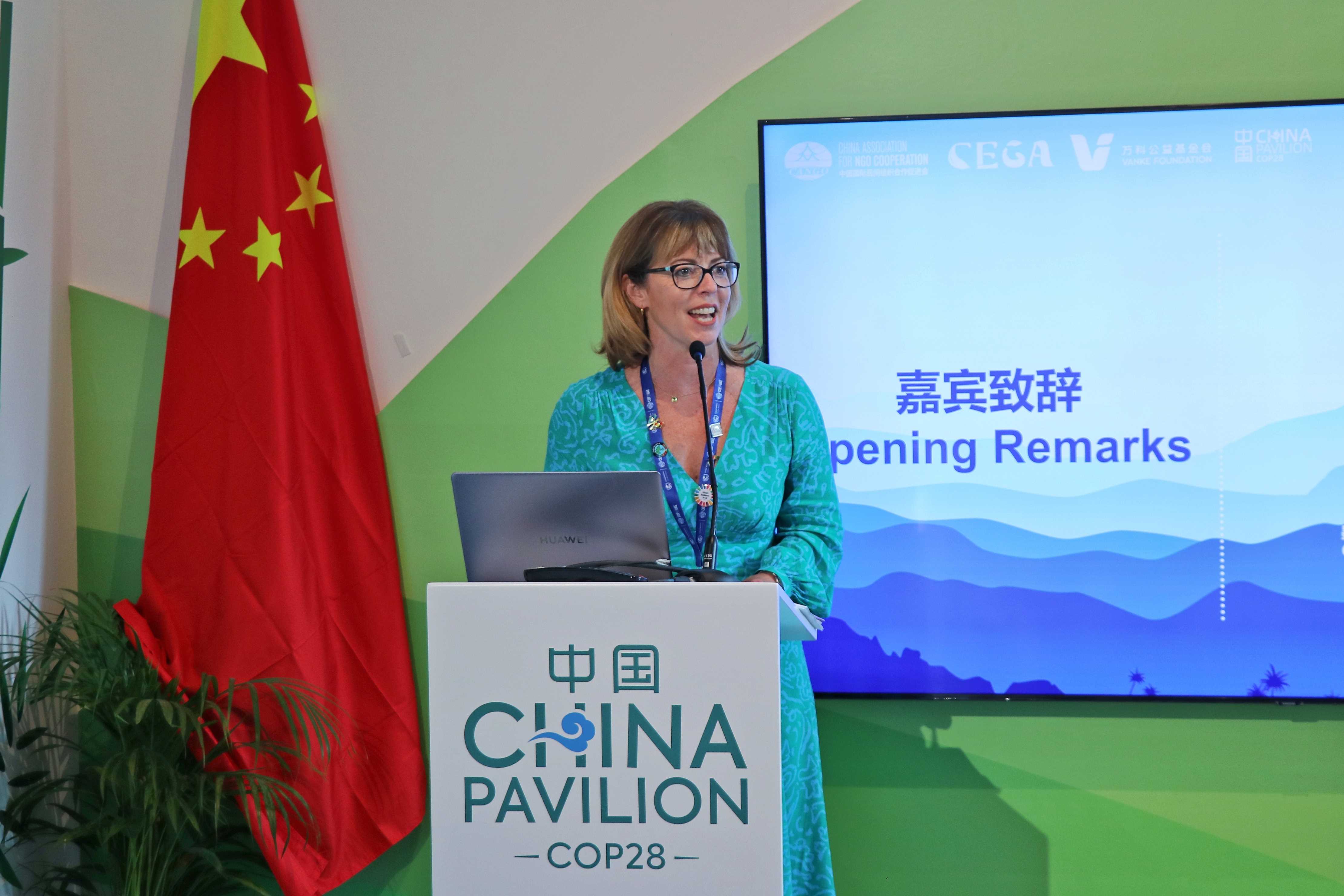
Tiffany Crawford, Co-Director, Climate Change and City Resilience and Chief of Heat, City of Melbourne
In her keynote speech, Gender Just Green Transition, Wang Qing, Gender and Climate Change Programme Officer at UN Women China, shared UN Women China’s efforts to advance gender equality in China's green transition process. In rural areas of Qinghai and Hunan province, UN Women China has worked on enhancing rural women's access of climate smart agricultural resources, including renewable energy technologies and assets. These efforts have empowered around 120,000 rural women and 6 women-led agri-businesses till date, and have successfully enhanced women's income and leadership in green rural revitalization. UN Women China has also engaged enterprises to perform gender-responsive business practices, successfully integrating Women's Empowerment Principles (WEPs) into industrial standards. She suggested that to realize a gender-just green transition, systematic approaches shall be in place, including enhancing women’s leadership and decision-making power in policies and programmes; increasing financing for gender-responsive climate, environmental and disaster risk initiatives; and supporting women’s organizations, enterprises, cooperatives, and smallholder women farmers.
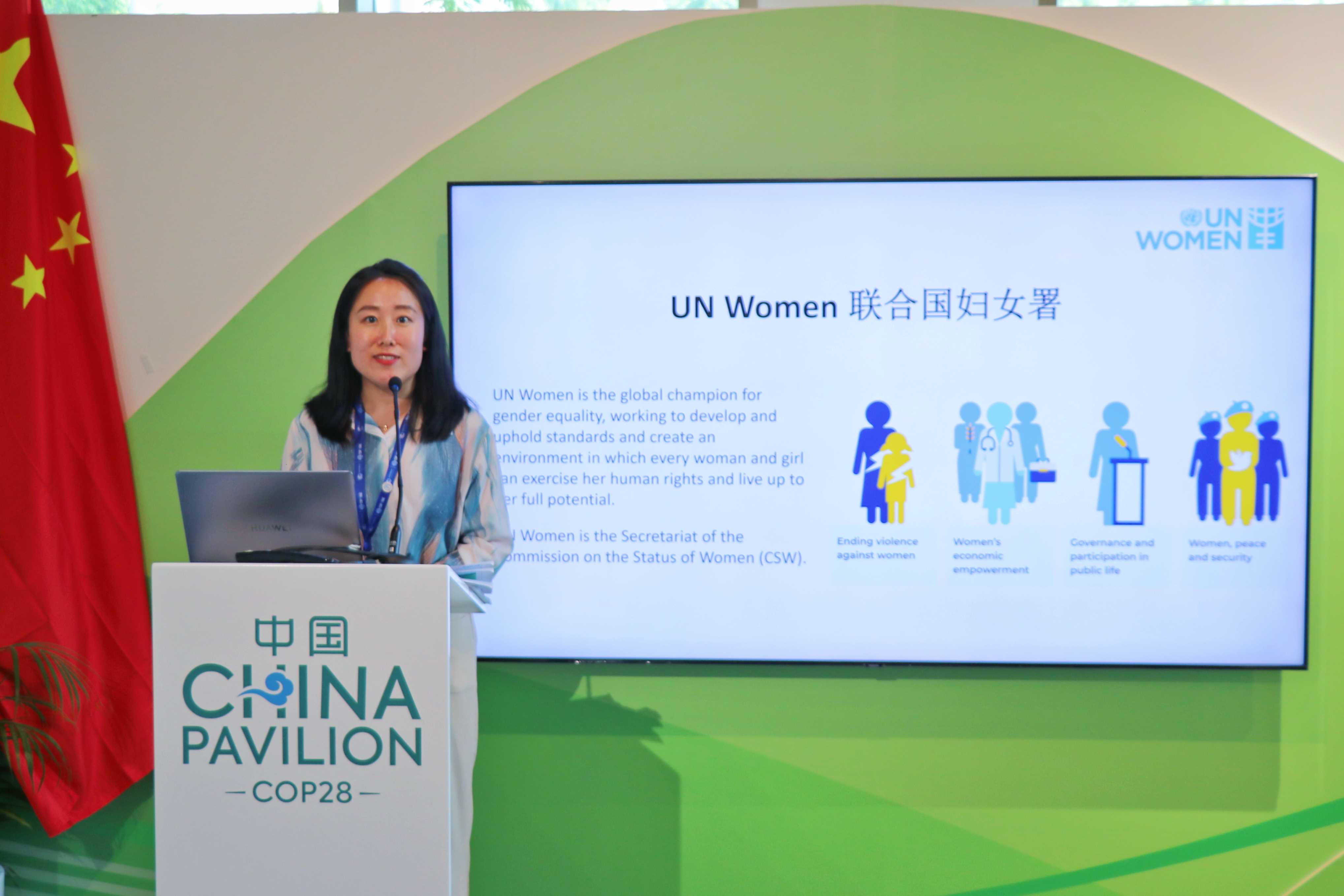
Wang Qing, Gender and Climate Change Programme Officer, UN Women China
Senior Director and Operations Chief Executive, WWF UAE, Manal Bahman, addressed the important role of women in fighting climate change. Manal acknowledged UAE’s tremendous achievements in both overall unity and women’s inclusion, with more than half of the country’s university degrees in STEM awarded to women, and UAE raking top three globally for wage equity. Considering women’s vulnerability to climate change and consequential social, political, and economic impacts, Manal stressed the need for more collective efforts in embracing inclusiveness. Working in joint efforts and encouraging women to be heard and to be involved at every level of decision-making, will create a systematic approach and active mechanism to engage the best of talents, facilities, and technologies to confront graves challenges of climate change.
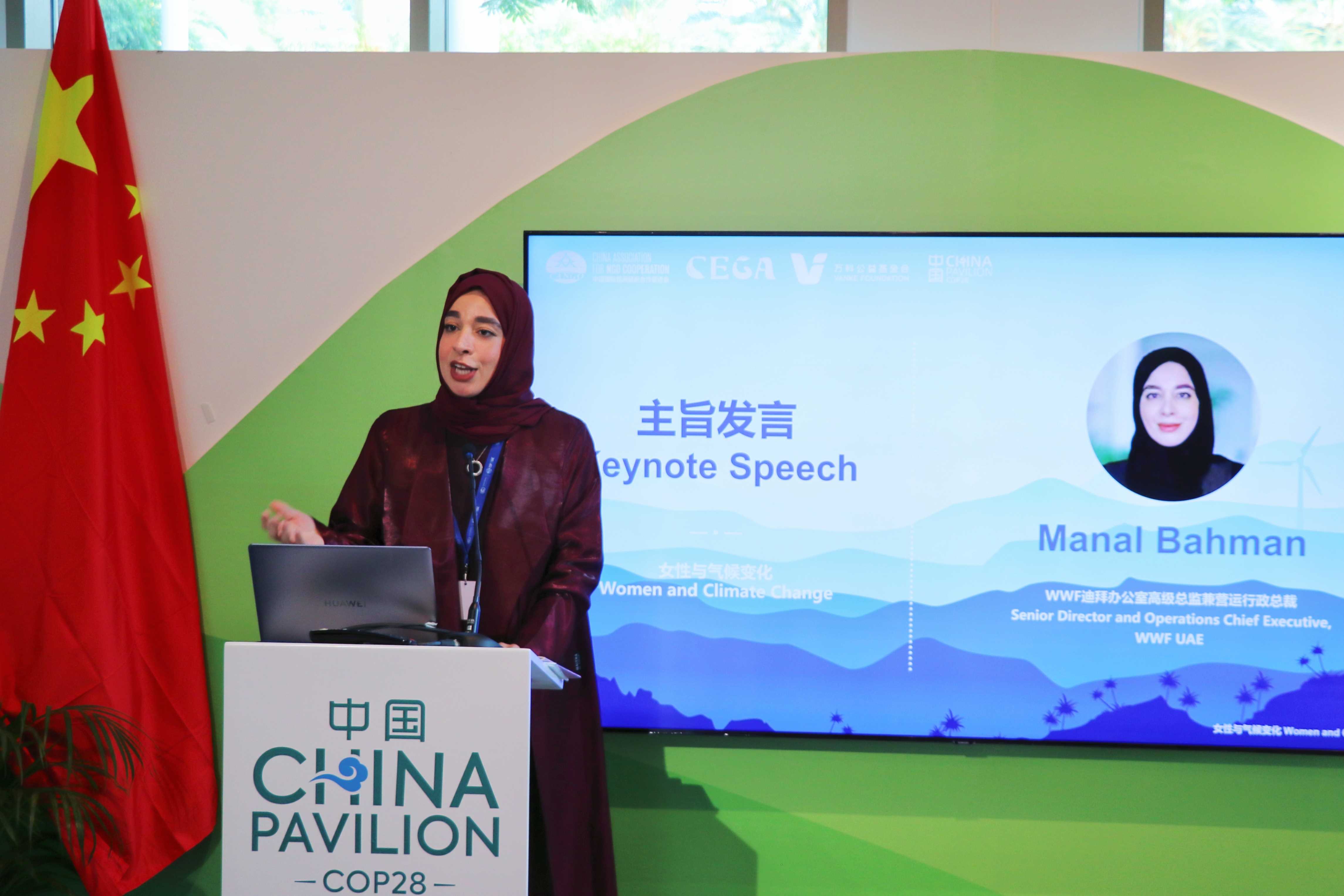
Manal Bahman, Senior Director and Operations Chief Executive, WWF UAE
Managing Director for Inclusion and Global Leadership, C40, Caterina Sarfatti, spoke on the role of women in building green inclusive communities. Caterina expounded on how mayors of C40 cities around the world have worked in joint efforts to make climate policies more gender-inclusive, and shared the accomplishments that had been achieved through the process. Practice shows that inclusivity and consideration of women in the process of policy making has led to policies that are not only gender-sensitive, but also more affective to all.
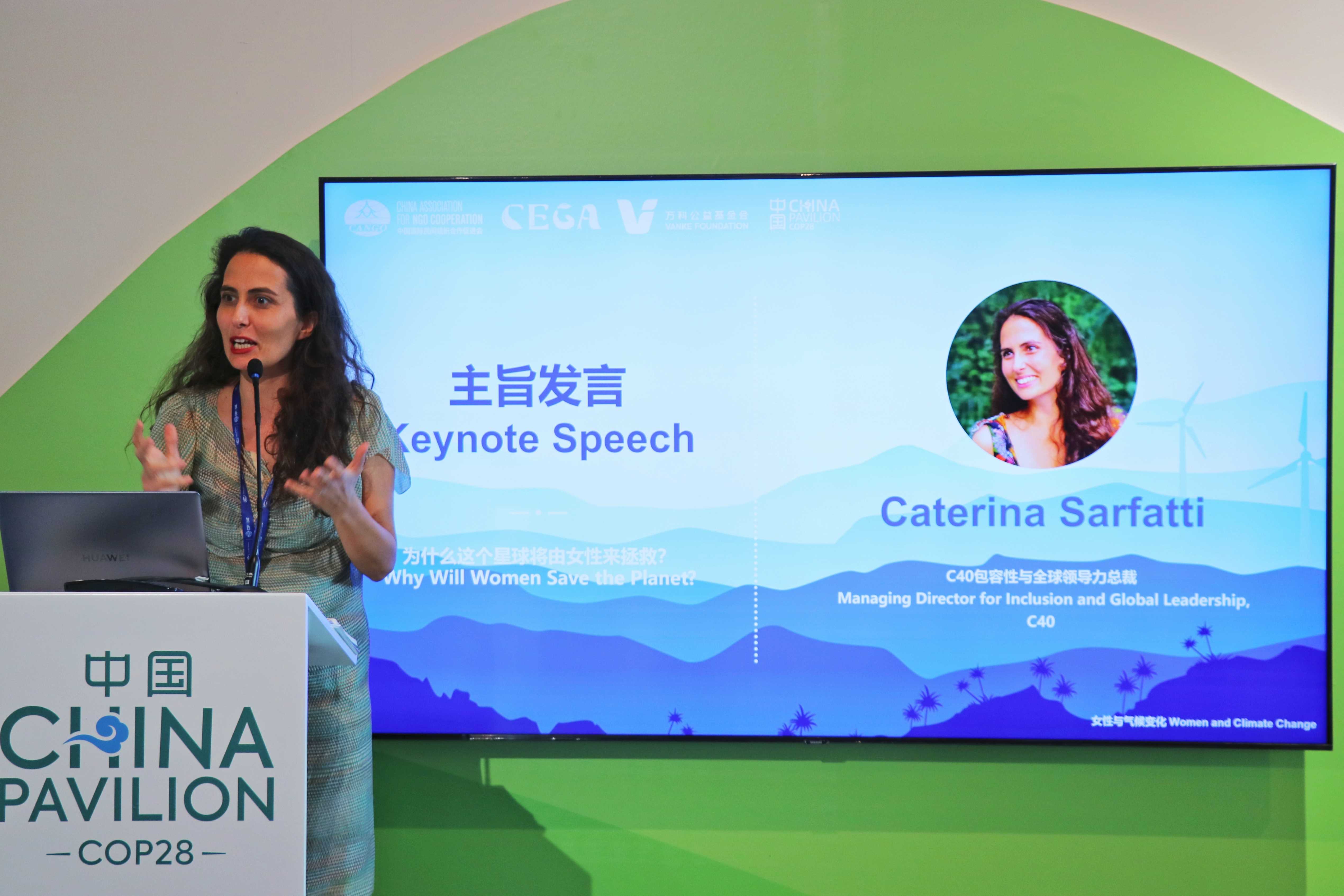
Caterina Sarfatti, Managing Director for Inclusion and Global Leadership, C40
CEO of Beijing Microalgae Biotechnology Co. Ltd., Zhang Yu, emphasized in his keynote speech the increasing pressure climate change has brought upon countries' agricultural production. This has especially affected Asia-Pacific countries where rice is a main agricultural product. Since rice is an intensive farming crop, it's production in Southern and Southeastern Asia is still led by women’s labor, which has brought upon local families both economic pressure and women’s health issues, such as lumbar spondylosis, arthritis, and other progeria diseases. As a biotechnology company driven by scientific research, Beijing Microalgae Biotechnology aims to increase the energy density ratio of agricultural production through technology. Technological innovation has not only reduced carbon emission, but also provided an additional sustainable, stable, and considerable source of income for local farmers.
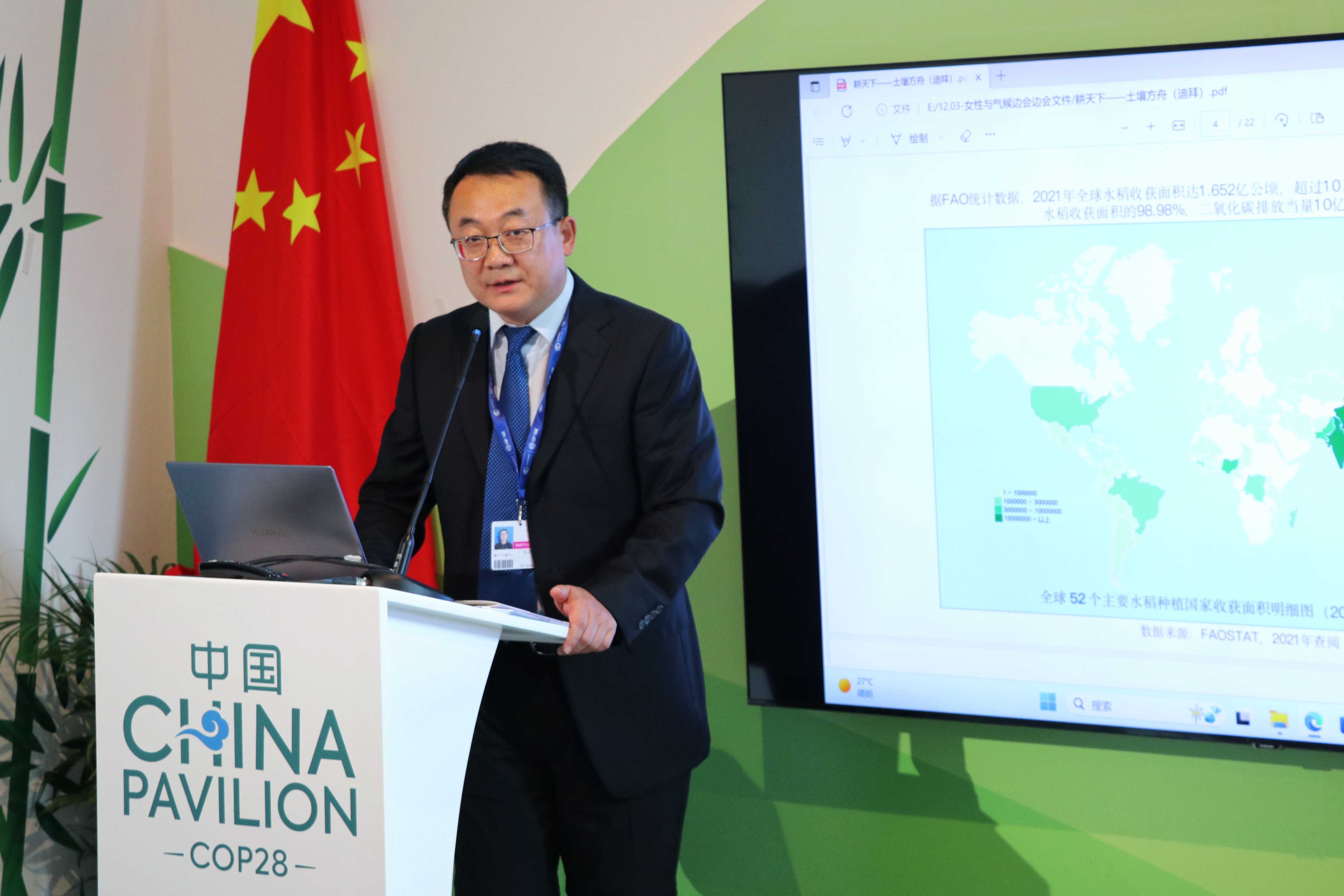
Zhang Yu, CEO of Beijing Microalgae Biotechnology Co. Ltd.
Chatham House Academy Associate, Nina Jeffs, shared Chatham House’ research on gender and climate change. Nina discusses research results on collaborative work across China’s national climate action, rural revitalization, and women’s development goals, as well as recommendations on how synergies among these areas can make climate action more effective and sustainable. Research shows that China’s NGO community is becoming increasingly interested in gender and inclusion in climate action, with related interdisciplinary practices emerging, leading to a large potential for innovation and impact. Results suggest that targeted solutions such as further research, data collection, and dedicated funding could help advance this trend.
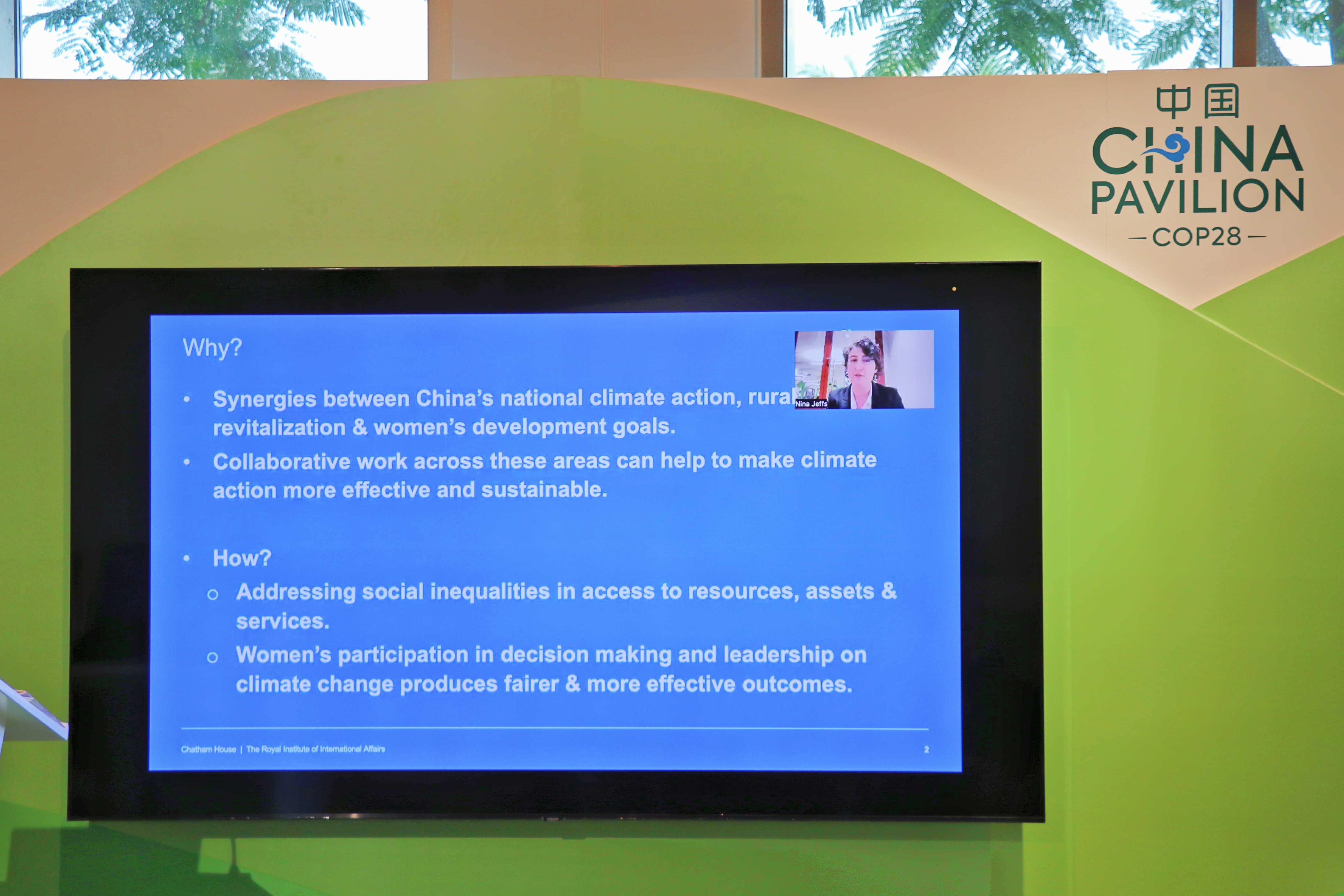
Nina Jeffs, Academy Associate, Chatham House
Women have always been at the forefront of environmental protection. They have valuable knowledge and expertise that can help build resilience against climate change and reduce greenhouse gas emission. Liu Jiashun, Vice Chairperson & Executive Director of China Green Carbon Foundation, moderated the discussion with panelists Li Nuyun, Dean of the Chinese Institute of Green Carbon, Cheng Mian, Project Manager at Vanke Foundation, Mohammad Emran Hasan, Head of Climate Justice and Natural Resource Rights, Oxfam in Bangladesh, Rumaitha Al Busaidi, Founder of WomeX, and Madhavika Bajoria, Director, Partnerships at AVPN. Together they discussed the intersecting topics of women and climate change, analyzed the impact of climate change on women from women’s perspective, how organizations could empower more women to better respond to climate change, and enhance women’s leadership in the field of environmental public welfare.

Panel Discussion Group Photo
At the end of this side event, Vice Chairperson and Executive Director of CANGO, Wang Xiangyi, released the collection of “Her” stories, which included touching stories of 19 outstanding women in China's environmental public welfare community, along with their rich experiences in this field. The collection also shares “Her” unique wisdom participating in environmental protection work and “Her” leadership role and participation in social governance. CANGO will continue to encourage and inspire women, cultivating the development of women’s leadership in the field of environmental public welfare

Report Release: Collection of “Her” Stories in Environmental Public Welfare


